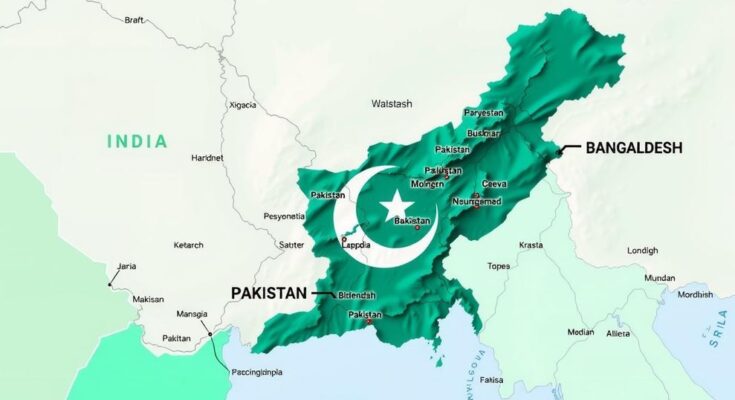Bangladesh is warming relations with Pakistan after Prime Minister Sheikh Hasina’s ousting, including direct trade and military cooperation. Historically strained ties have roots in the 1971 independence war. Experts suggest motivations may include countering India’s influence. Despite mutual interests, unresolved historical grievances pose challenges as both nations navigate changing political dynamics.
Recent political developments in Bangladesh have led to unexpected improvements in relations with Pakistan, a longstanding adversary. Following Prime Minister Sheikh Hasina’s ousting last year, Bangladesh has initiated direct trade with Pakistan, importing 50,000 tonnes of rice. In addition, both nations have revived direct flights, military contacts, and collaborated on security matters after decades of strained relations.
The deep-rooted animosity between Bangladesh and Pakistan originates from the 1971 war for independence, during which India supported the Bangladeshi rebels. Historically, relations between the two nations fluctuated, with a brief period of cordial ties between 2001 and 2006. However, during Hasina’s tenure, relations soured as she closely aligned with India and distanced herself from Pakistan. Following her recent departure to India, there has been renewed interest in bilateral relations.
Experts emphasize that the current warming of relations might have underlying strategic motives, with scholars like Ayesha Siddiqa suggesting that Pakistan and Bangladesh may seek to counter India’s influence. The two nations have engaged in various diplomatic activities, including meetings between their leaders and increased military cooperation.
Ms. Veena Sikri, India’s former high commissioner to Bangladesh, expressed concern about the revival of military ties, recalling previous allegations regarding insurgent training in Bangladesh by Pakistan’s ISI. Despite the historical tensions, Bangladeshi diplomats assert that meaningful normalization of relations with Pakistan can only occur if issues from the 1971 war, including demands for an apology from Pakistan for past atrocities, are addressed.
The resolution of these historical grievances remains a significant hurdle. Both Ikram Sehgal, a former Pakistani officer, and Mr. Kabir, a Bangladeshi diplomat, believe that acknowledging the past is essential for progressing towards better bilateral ties. Economists urge both countries to focus on enhancing trade relations, which currently stand at less than $700 million, with potential for significant growth given Pakistan’s large population.
The imminent visit by Pakistan’s Foreign Minister Ishaq Dar in April and anticipations surrounding Bangladesh’s general elections later this year may impact the trajectory of future interactions. Ultimately, maintaining a peaceful relationship with a stable Bangladesh remains a critical concern for India, especially regarding its northeastern borders.
In summary, the recent thawing of relations between Bangladesh and Pakistan marks a significant shift in South Asian geopolitics, sparking apprehensions in India. While historical grievances continue to challenge bilateral interactions, both nations may benefit from prioritizing economic cooperation. The evolving diplomatic landscape, including imminent meetings and potential electoral changes in Bangladesh, will undoubtedly influence the future of these relationships, underscoring the complex interplay of regional politics.
Original Source: www.bbc.com




